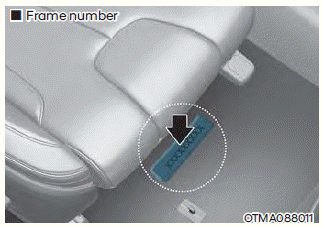Hyundai Santa Fe: Windshield Wiper/Washer / Rain Sensor. Repair procedures
| •
|
Do not damage or touch the silicone (coupling medium).
|
| •
|
Be careful so that the silicon is not contaminated by foreign
substances, dust, etc. .
|
| •
|
Use caution, as the silicon may be damaged if you try to separate
the rain sensor forcibly.
|
|
| •
|
The dust or foreign substance on the rain sensor may have bad
influence on the performanec of the rain sensor. In order to
ensure accurate function of the rain sensor, protect the sensor
surface with the protection cover until the sensor is installed
on the bracket.
|
| •
|
The coupling pad on the rain sensor surface is adhesive and
the coupling pad may stick to the windshield during the use
depending on the environment condition.
Therefore, it may be damaged when you try to remove the rain
sensor from the windshield forcibly. Use caution when sepearting
it from the windshield.
|
|
|
1. |
Remove the rain sensor cover (A)&(B).

|
|
2. |
To remove the latch, pull aside the latch using the cover hole with
a small flat-blade screwdriver (A).

|
|
3. |
Remove the rain sensor.
| 1) |
Insert a small flat-blade screwdriver (-) into a space at the
bottom(B) or top(A), between the rain sensor and bracket. .
|
| 2) |
Pull the rain sensor slowly up and down in the vertical direction
of the glass, then disassemble the rain sensor slowly from windshield
without damaging the silicone on the sensor.
|


|
• |
It may be damaged when you try to remove the rain sensor
from the windshield forcibly. Use caution when sepearting
it from the windshield.
|
|
• |
When detaching the silicone under a high temperature,
it may be easily damaged because of the adhesive strength
of the silicone. Remove the silicone in a cool enviroment.
|
|
|
|
4. |
Disconnect the wiring harness connector (B) from the rain sensor by
inserting a small flat-blade screwdriver (A) into the space.

|
| •
|
Check the operation of the rain sensor and the light sensor
before mounting.
|
| –
|
Check the sensor for silicon damage.
|
| –
|
Check whether the rain sensor connector is tightened.
|
| –
|
Check whether the rain sensor and bracket are properly tightened.
|
| –
|
Check whether the sensor mounted area is free from foreign matters.
|
| –
|
Recalibrate sensitivity of the swtich if the auto-wiping operation
is insensitivity or too much sensitive.

|
| •
|
In case the silicone of the rain sensor is normal or slightly
damaged as shown in the below images, it can be reused.
Normal
|
Damage within 1.5 mm of outer part
|
|

|

|
|
| •
|
In case the silicone of the rain sensor is damaged as shown
in the below images, it should be replaced with a new silicone.
Foreign substances
|
Fingerprint
|
Damege
|
|

|

|

|
|
| •
|
In case the silicone of the rain sensor is damaged it should
be replaced it as shown below.
1) Remove the damaged silicone gel pad from the lens plate completely.

|
• |
Be careful not to damage or contaminate the
surface of the lens plate during removal.
|
|
2) Attach the new silicone gel pad aftet removing the silicone
paper (A) then remove the transperent film (B).

|
• |
When attaching the silicone gel pad to the sensor,
be careful not to contaminate
|
|
|
| •
|
It is very important that the silicon (coupling pad) is completely
pushed against the windshield and stuck without any air bubble.

|
| •
|
In case of replacing the damaged windshield, you may reuse the
undamaged exisitng rain sensor.
|
| •
|
The windshield glass has to be clean and free of contamination
or foreign substances.
|
|
|
1. |
Connect the rain sensor connector.
|
|
2. |
Push one of the latch of spring arm (A) down until it snaps and you
hear a click sound.
And then push the latch of second spring arm (B) for keeping the sensor
in right position.

|
• |
Do not snap both spring arms at the same time.
|
|
• |
An incorrectly mounted snap connection may cause malfunctions
of the rain/light sensor.
|
|
|
Other information:
Inspection
Basic Inspection
1.
Basic inspection is performed as follows.
(1)
Check indicator after entering self - diagnosis mod.
(2)
Check battery terminals and state of charge...
ECM Terminal and Input/Output
signal
ECM Terminal Function
Connector A
Pin No
Description
Connected to
1
Power ground
Chassis Ground
2
-
-
3
-
-
4
-
-
5
-
-
6
Fuel Sender Signal
Fuel Sender
7
-
-
8
-
-
9
-
-
10
-
-
11
-
-
12
-
-
13
-
-
14
-
-
15
Stop Lamp Signal
Stop Lamp
16
Brake Test Switch
Brake Switch
17
18
-
19
-
20
Output Speed (Supply)
ATM Solenoid Valve (Otput Speed)
21
Input Speed (Supply)
ATM Solenoid Valve (Input Speed)
22
-
-
23
-
-
24
-
-
25
-
-
26
-
-
27
[A/T] SOL...
Categories
Vehicle Identification Number (VIN)

The vehicle identification number (VIN) is the number used in registering your
vehicle and in all legal matters pertaining to its ownership, etc.
The number is punched on the floor under the passenger seat. To check the number,
open the cover.
read more
























